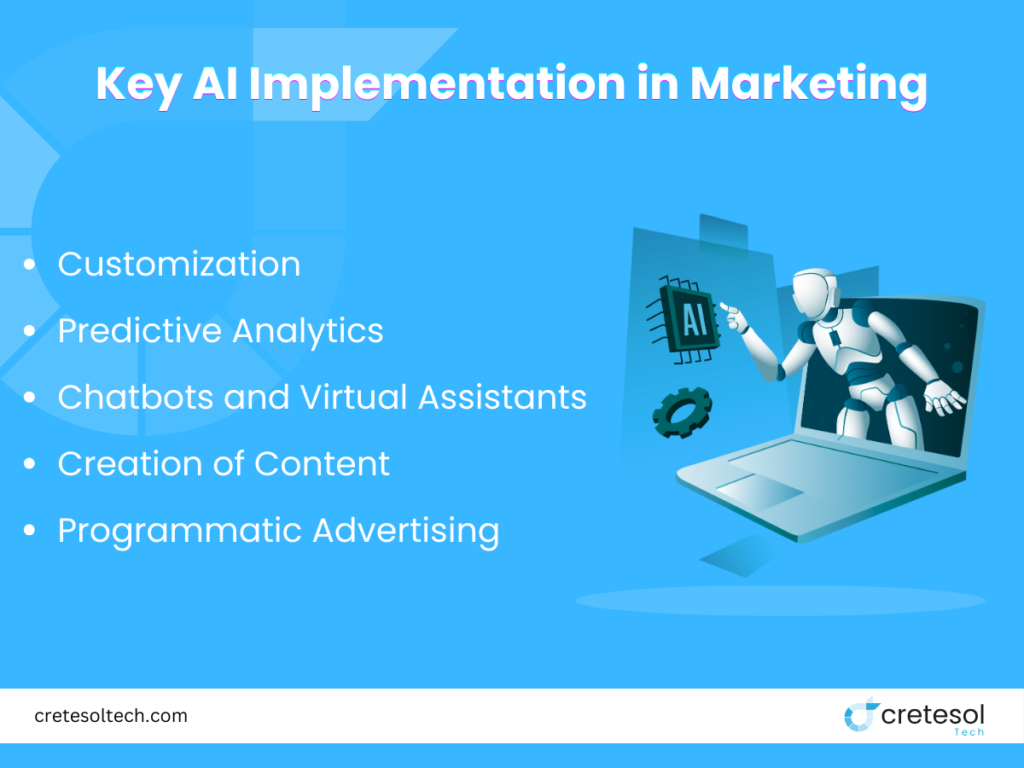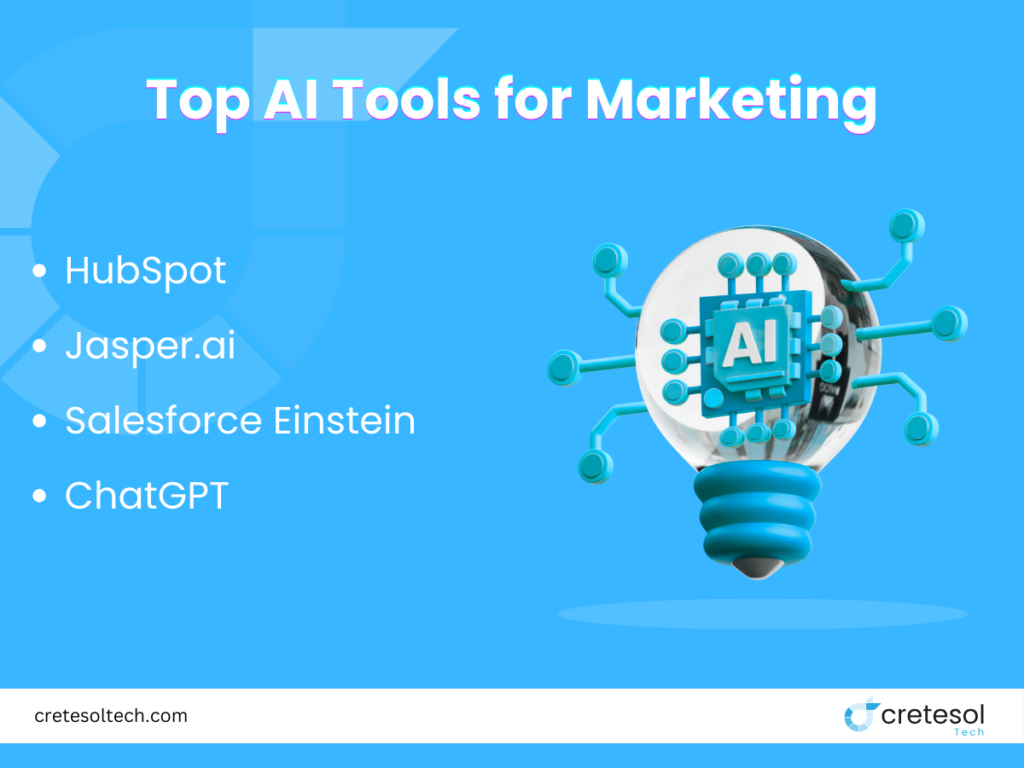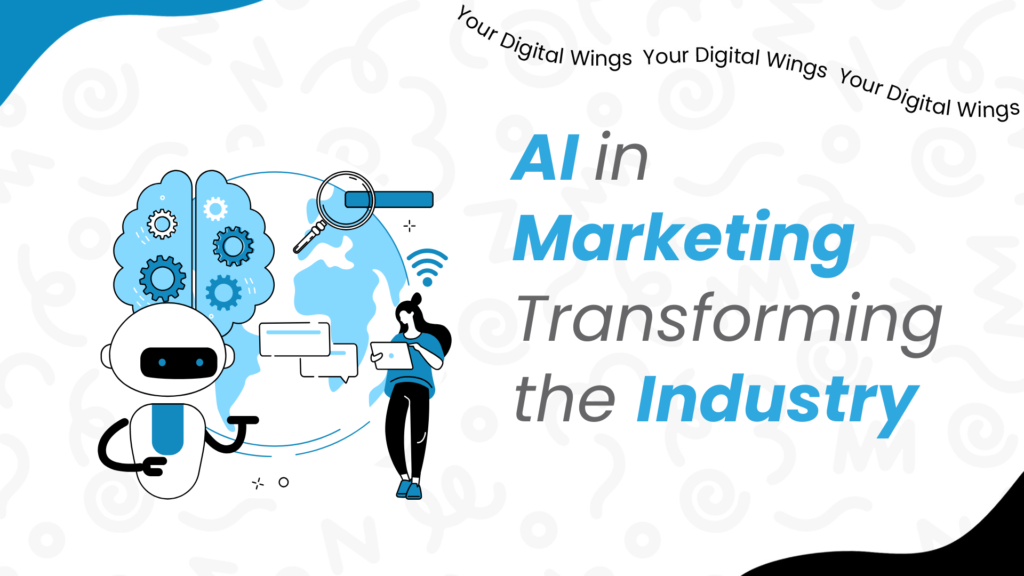The introduction of AI in marketing has transformed the marketing industry immensely. With the help of AI, brands can create individualized campaigns and instantly optimize advertisements.
This blog will look into how AI functions in combination with marketing to expand, automate, and produce verifiable outcomes in the business.
What is AI in Marketing?
AI marketing is defined as the deployment of machine learning, automated speech recognition, and data analysis for predictive analysis and improving decision-making processes.
Whereas in the past, marketing relied on basic methods, AI marketing tools can now manually analyze enormous quantities of data within seconds. They also reveal insights that may go undetected by the human hand.
An example is advertising, where Salesforce Einstein provides tools to apply AI to predict sales pipelines, and HubSpot uses AI-powered software to automate lead scoring.
The primary goals of AI in marketing include:
- Achieving better targeting of customers.
- Improving campaign performance.
- Providing unique experiences tailored to every customer at scale.
The Role of AI in Marketing
AI works as a tool to assist marketers. Here’s how it works:
| Traditional Marketing | AI-Driven Marketing |
| In-depth data review | Campaign Insights |
| Campaigns for everyone | Campaigns for specific people |
| Performing A/B testing takes time | Instant optimization |
AI has revolutionized marketing by automating menial work, such as dividing audiences by demographics or planning organic posts. AI tools for marketing give teams more time to pour their efforts into creativity.
For instance, chatbots now address customer queries in real-time online, while social media conversation forecasts using IBM Watson help to identify customers at risk of leaving.
Key AI Implementation in Marketing

With the tools of artificial intelligence in hand, marketing can now be accomplished smarter, quicker, and with unprecedented efficiency. Let us explore some of the most impactful AI tools in marketing that are transforming the industry:
Customization
Using AI for Customization is essential in this age as it strives for data collection and the patterns related to their purchase intention. The following examples illustrate how customization works:
For Example :
Netflix keeps its audience glued to the screen by suggesting shows and movies through AI.
Amazon makes additional sales by recommending products through AI.
As a result of providing extremely customized content, organizations can increase customer satisfaction, loyalty, and conversion rates.
Predictive Analytics
One of the strongest AI marketing tools used in marketing is predictive analytics. It relies on past information and a machine learning model to predict future behaviors and data points. This is how predictive analytics helps businesses grow:
| Benefit | Impact |
| Customer Lifetime Value | Target campaigns to specific high-value audiences. |
| Churn Prediction | Provides retention to at-risk customers with personalized offerings. |
| Demand Forecasting | Provides retention to at-risk customers with customized offerings. |
For example, e-commerce brands leverage predictive analytics to foresee marketing spikes during a season and prepare accordingly.
Chatbots and Virtual Assistants
Virtual assistants and chatbots are fundamentally changing customer service and customer experience. Some benefits are:
Constant Availability: Users receive immediate assistance regardless of time zones.
Cost Effective: The size of customer support teams can be significantly reduced.
Greater Engagement: The interactions are more interesting and relevant to users.
For example, Sephora’s chatbot recommends appropriate makeup, boosting user engagement and sales.
Creation of Content
Providing high-quality content in bulk is an issue for several marketers. AI marketing tools, Jasper.ai and Copy.ai, are designed to help with their unique capabilities. AI-aided creation of content helps in the following ways:
Time-Saving: Writing task repetition is automated.
Creativity Enhancement: New approaches and concepts are provided.
Consistency Improvement: Brand voice is recognized across platforms.
For example, a small business can rely on Jasper.ai to create SEO-optimized blog posts, thus increasing organic traffic without the expense of a full-time writer.
Programmatic Advertising
Ad purchasing and placement are automated through advertising technology. IT and marketing AI integration handle this. The Trade Desk and Google Ads have algorithms to monitor users in real-time and target them accordingly.
For example, a vacationing brand can utilize ad tech and target users looking for travel offers to display the ads at the most opportune times.
Pros & Cons of AI in Marketing
Pros
- Efficiency: Marketing professionals reuse and repurpose existing content when possible, making the workflow smooth.
- Scalability: Delivers tailored messages to the masses.
- ROI: Achieves enhanced return on marketing investments by spending less on ads smarter rather than more ad dollars.
Cons
- Data Privacy: AI-enabled marketing software usage demands stringent adherence to rules like GDPR.
- Over-reliance: While AI can help automate tasks, there will always be a need for human creativity.
Top AI Tools for Marketing
| Tool | Use Case | Best For |
| HubSpot | Email automation, CRM | Lead nurturing |
| Jasper.ai | Content generation | Social media, Blogs |
| Salesforce Einstein | Predictive analytics | Sales forecasting |
| ChatGPT | Chatbots, customer support | 24/7 engagement |

Businesses may save expenses, save time, and increase conversions with the help of these AI tools for marketing.
Implementing AI in Marketing Strategies
Challenges of AI in Marketing
These are some of the challenges of AI and marketing.
- Privacy Issues: AI requires excellent volumes of user information, which makes compliance, security, and ethical use questionable.
- Discrimination through Algorithms: AI is prone to discriminatory practices due to the bias within the analytics training data.
- Costly to Implement: The development and deployment of AI applications is expensive, and this poses a challenge to a majority of small businesses.
Future of AI in Marketing
- Hyper-personalization: Customers will be served in every aspect due to AI’s real-time, behavior-driven content recommendations.
- Predictive Analytics: AI will make crafting actionable plans easier by studying consumers’ behavior to predict trends.
- AI-Powered Automation: Efficiencies in marketing tasks like email targeting, advertising, and chatbots will drastically increase.
- Voice Search & Conversational AI: Natural Language Processing will assist in modifying content to enable easy retrieval through voice commands and support digital assistants.
Conclusion
AI in marketing is more than just a buzzword; it is a revolutionary opportunity. When brands utilize AI tools in marketing, exceptional productivity, and customer understanding become the norm. The future world is for those brands that combine the strengths of AI and humans.
FAQ’s
AI automates repetitive work, boosts the level of personalization, improves ad targeting, and increases customer understanding through real-time data processing.
AI will develop hyper-personalization, predictive analytics, voice search, and augmented reality experiences while ensuring adherence to ethical guidelines.
Any computer program that uses AI to automate and optimize functions in marketing is an AI marketing tool, such as chatbots, predictive analytics, and AI-driven ad placement.
AI helps deliver personalized content and agricultural sentiment through social media, and real-time customer interactions are enhanced by AI user engagement.

 United Arab Emirates
United Arab Emirates